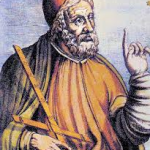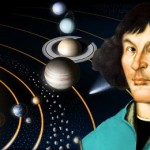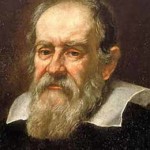Any kid of 8 in the US who’s paid the least amount of attention in school knows that the sun is the center of our solar system and that the earth revolves around it. This is of course contrary to personal observation, because the earth seems to stand still while the sun revolves around it, “rising” in the east in the morning and “setting” in the west 12 hours (give or take) later. The benefit of observations made over the last several hundred years by astronomers beginning with Copernicus is seen in the fact that virtually all people understand this little tidbit of celestial awareness.
But it wasn’t always like that. Claudius Ptolemy was a Greek citizen of Rome who lived in the city of Alexandria in what is now Egypt. He was born at the end of the fi rst century C.E. and developed a model to describe the workings of the universe that lasted for nearly a millennia and a half. By all accounts Ptolemy was a smart guy; he wrote important treatises in mathematics and geology in addition to astronomy. He just got it exactly wrong when it came to astronomy; he said that the earth was at the center of the universe, and everything revolved around us. Given our personal experience, it seems a reasonable conclusion: the earth doesn’t feel to us like it’s moving, and we can clearly see the objects in the night sky slowly move from one horizon to the other each night. As we all know however, that’s not what happens. But it took a long time and no little pain (both mental and physical) to change that, which gives us some idea of how people respected Ptolemy’s work.
rst century C.E. and developed a model to describe the workings of the universe that lasted for nearly a millennia and a half. By all accounts Ptolemy was a smart guy; he wrote important treatises in mathematics and geology in addition to astronomy. He just got it exactly wrong when it came to astronomy; he said that the earth was at the center of the universe, and everything revolved around us. Given our personal experience, it seems a reasonable conclusion: the earth doesn’t feel to us like it’s moving, and we can clearly see the objects in the night sky slowly move from one horizon to the other each night. As we all know however, that’s not what happens. But it took a long time and no little pain (both mental and physical) to change that, which gives us some idea of how people respected Ptolemy’s work.
 Around the 1500’s, our aforementioned Nicolai Copernicus (1473-1543) made the observation that the earth does not in fact sit still; it revolves around the sun once a year. He got much of the rest wrong; he thought that the sun, not the earth was the center of universe, and all the stars spin around the sun. (Nerdly aside: the notion that the earth is the center of the universe is called “geocentrism;” the belief that the sun is at the center of the universe is called “heliocentrism.”) Given that lens-grinding was still in its infancy and the first telescopes were just beginning to be developed, I think Copernicus can be forgiven for his mistakes. Especially since it had been “common understanding” for 15 centuries that Ptolemy had it right. Over the next couple of hundred years more and more very smart people started looking differently at the stars and the picture we know to be true today gradually emerged. But as I said, it didn’t happen overnight. In fact, there was considerable resistance to this novel concept, and not just from the Ptolemy-loyalists among the other night-sky observers.
Around the 1500’s, our aforementioned Nicolai Copernicus (1473-1543) made the observation that the earth does not in fact sit still; it revolves around the sun once a year. He got much of the rest wrong; he thought that the sun, not the earth was the center of universe, and all the stars spin around the sun. (Nerdly aside: the notion that the earth is the center of the universe is called “geocentrism;” the belief that the sun is at the center of the universe is called “heliocentrism.”) Given that lens-grinding was still in its infancy and the first telescopes were just beginning to be developed, I think Copernicus can be forgiven for his mistakes. Especially since it had been “common understanding” for 15 centuries that Ptolemy had it right. Over the next couple of hundred years more and more very smart people started looking differently at the stars and the picture we know to be true today gradually emerged. But as I said, it didn’t happen overnight. In fact, there was considerable resistance to this novel concept, and not just from the Ptolemy-loyalists among the other night-sky observers.
About 50 years after Copernicus made his observations (which, as I said, were met with considerable skepticism by the other thinkers of that time,  particularly The Church) Galileo Galilei (1564-1642) was born. Galileo was strongly influenced by Copernicus, and in fact expanded significantly on Copernicus’ observations about heliocentrism, but in so doing he ran afoul of The Church.
particularly The Church) Galileo Galilei (1564-1642) was born. Galileo was strongly influenced by Copernicus, and in fact expanded significantly on Copernicus’ observations about heliocentrism, but in so doing he ran afoul of The Church.
The Church (there was really only one at the time; today of course it’s known as the Catholic Church) was not pleased, to put it mildly. They took umbrage at Galileo’s (and others), for this position because of its larger implications. After all, Earth was clearly identified in the Bible as God’s direct creation, the place where He put the pinnacle of his effort (man, naturally) and where he sent his Son (or Himself, as the Athanasian Creed defines God) to atone for the sins of mankind. And if the earth is that important in God’s plan for the universe, it clearly made sense that it be the pivot point around which everything else in the entire universe revolved. The Bible even says that “(God) set the earth on its foundations; it can never be moved.” (Psalms 104:5) So for some upstart astronomers to claim otherwise clearly challenged the primacy of the earth, God and His proxies on earth (or at least, as they thought of themselves), the Catholic hierarchy.
At that time, the Church was so closely linked to the government that they were virtually the same. If the Church wanted something badly, she was going to get it. So if you displeased the Church you were in deep trouble. Galileo was charged and subsequently convicted of heresy; he was able to save his life by recanting, saying he was wrong and the earth was the center of the universe. The story is that, as he was leaving the presence of the Pope he said (presumably under his breath) “And yet, it moves!” In any case, the Church accepted his reversal, sparing him from a death sentence, but he spent the rest of his life under house arrest. That sounds pretty harsh, but a contemporary of his, a Dominican friar named Giordano Bruno, was not nearly so lucky. He was also an astronomer (in addition to having expertise in mathematics, philosophy and poetry), but he went even farther than Galileo; he postulated (correctly, as it turned out) that the stars were nothing but distant versions of our Sun, with their own planets and moons circling them, and even having the possibility of supporting life on their local planets. For his position (and refusal to recant), he was burned at the stake. (There are some who say that what really caused his death sentence was his mocking of the Pope rather than his positions on the nature of the universe, but that is a minority view, promoted largely by today’s Catholic church. Make your own judgement.)
The Enlightenment (a topic for several future blog entries) took the position that we could obtain answers about the physical world through careful observation; we didn’t need to depend on miracles or explanations that “God did it.” One clear example is the what we’ve been discussing: the observations of these early astronomers such as Copernicus, Galileo, Bruno and others. They looked up at the sky, watched what happened for a while and then, using nothing more than their brains and the rules of mathematics, figured out that the earth simply couldn’t be the center of the universe.
I think about that when I reflect on the vastness of the universe. As I said in my last blog entry, we’re on a planet circling a fairly unimpressive star, in one of the outer arms of a minor galaxy, out on the far end of Laniakea (our Super Cluster). There is absolutely nothing to make us stand out in any way, except for the fact that we’re here. It’s far more likely (given the number of stars we know have planets, and extrapolating that to the universe) that there are many places where life emerged, than that we are alone in the universe. So it makes me think how arrogant those Church leaders were, insisting against all the facts that literally everything in the universe revolved around us.
It would be laughable, except that they burned people to death if they disagreed.
